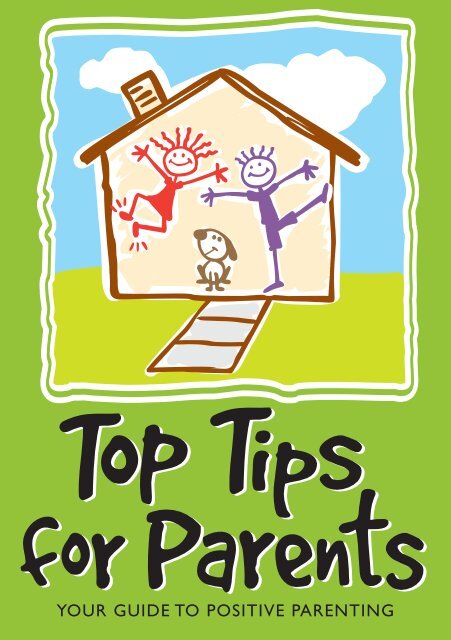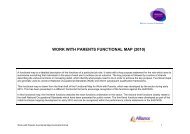YOUR GUIDE TO POSITIVE PARENTING - Parents Advice Centre
YOUR GUIDE TO POSITIVE PARENTING - Parents Advice Centre
YOUR GUIDE TO POSITIVE PARENTING - Parents Advice Centre
Create successful ePaper yourself
Turn your PDF publications into a flip-book with our unique Google optimized e-Paper software.
<strong>YOUR</strong> <strong>GUIDE</strong> <strong>TO</strong> <strong>POSITIVE</strong> <strong>PARENTING</strong>
Introduction<br />
Changes To The Law<br />
In September 2006, the law on physical punishment was changed. If a<br />
parent harms his/her child through physical punishment, the defence<br />
of reasonable chastisement will now only be considered if the harm is<br />
seen as minor.<br />
Everyone accepts that children must learn right from wrong and<br />
develop the ability to get on with others. However, it is important to<br />
remember that you do not have a right to physically punish your child<br />
and you should, therefore, consider other methods such as positive<br />
parenting.<br />
Being a parent is a wonderful thing; however, it’s not always easy.<br />
Hopefully, the information in this booklet will show you how you can<br />
use techniques to guide, nurture and encourage your child and build<br />
your confidence as a parent.<br />
We want our children to behave well, and to:<br />
■ have respect for themselves and others;<br />
■ be polite to others;<br />
■ know how to behave in different situations;<br />
■ be able to concentrate and pay attention;<br />
■ share and to take turns;<br />
■ know how to win and how to lose.<br />
But children often behave quite differently, and we may feel annoyed,<br />
frustrated and embarrassed.<br />
This booklet suggests a few ideas to help you with your child’s<br />
behaviour.<br />
<strong>Parents</strong> of teenage children or children with a disability may face<br />
additional challenges and pressures, which are not addressed within<br />
this booklet. However, there are details of organisations that may be<br />
able to help in the contacts section at the back of this booklet.<br />
1 page
Contents<br />
Usual Behaviour 4<br />
What Makes Children Behave 4<br />
In Challenging Ways?<br />
Coping Under Pressure 5<br />
Tips for Helping With 6<br />
Children’s Behaviour<br />
Tip 1: Talk and Listen 6<br />
Tip 2: Play 8<br />
Tip 3: Understanding Changes 9<br />
As They Grow<br />
Tip 4: Set Boundaries 10<br />
Tip 5: Reward and Notice Good Behaviour 11<br />
Tip 6: Build Self Confidence 12<br />
Tip 7: Have Realistic Expectations and 13<br />
Allow Consequences<br />
Tip 8: Deal With Meltdown Moments Positively 13<br />
Tip 9: Look After Yourself 16<br />
Tip 10: When Things Are Getting Difficult 17<br />
Useful Contacts 18<br />
Comments 23<br />
3 page
page<br />
4<br />
Top Tips for <strong>Parents</strong><br />
Usual Behaviour<br />
Children may:<br />
■ have tantrums;<br />
■ shout and scream;<br />
■ hit siblings, parents, friends;<br />
■ not do as they’re told;<br />
■ break things, spill things, squash things;<br />
■ not listen or concentrate.<br />
This is not unusual. Children are learning what happens when they<br />
have a tantrum, hit another child, say rude words.<br />
Children will always push against boundaries.They are checking out<br />
what their parents will draw the line at, what they can and can’t do.<br />
This helps them understand what is acceptable and what isn’t.<br />
<strong>Parents</strong> work out their own ways of looking after their children.There<br />
is no simple recipe; it takes time for children to learn how to behave,<br />
and for parents to work out the best way of getting the best out of<br />
their child.<br />
What makes children behave in challenging ways?<br />
Children do not usually misbehave just to upset or annoy their<br />
parents.There is often a reason behind a child’s behaviour.<br />
It may be:<br />
■ they are upset or anxious about school;<br />
■ they feel jealous of their brother or sister;<br />
■ they want their parent to listen to them;<br />
■ they want their parent to spend time with them.<br />
Behaviour patterns can get stuck. At some point most children will<br />
misbehave to get attention. If a parent doesn’t pay much attention
when children are behaving well, some children will try ‘acting up’ to<br />
get attention, even if it results in a telling off.<br />
Coping Under Pressure<br />
Coping with your child’s misbehaviour can be stressful. Sometimes it<br />
can seem like you’re about to reach boiling point.<br />
<strong>Parents</strong> need to<br />
find ways to<br />
reduce the<br />
pressure in the<br />
home and can do<br />
a lot to help their<br />
child’s behaviour<br />
through positive<br />
parenting.<br />
In fact, parents can<br />
make the<br />
difference<br />
between their<br />
child’s behaviour<br />
getting out of<br />
control, and<br />
helping them<br />
manage everyday<br />
life in better ways.<br />
5 page
page<br />
6<br />
Tips for Helping With children’s Behaviour<br />
Tip 1: Talk and Listen<br />
As we know, all children are unique.<br />
Getting to know your own child, and knowing what makes them<br />
angry or agitated can help you prevent angry or upsetting situations<br />
before they happen.<br />
Talking and listening to your child helps them to understand what’s<br />
going on:<br />
■ Language: Try to use positive words.Tell your<br />
child what you want them to do, not what you<br />
don’t want them to do. Instead of “don’t make<br />
such a mess” try “tidy up your toys please”. This is<br />
an example of positive parenting.<br />
■ Change your tone: Your voice is a powerful tool.<br />
Sometimes changing your tone or volume can be<br />
enough to stop a<br />
fraught situation or<br />
get your child to do<br />
what you want. This<br />
can work equally<br />
well with older<br />
children. If you react<br />
or speak in a<br />
completely different<br />
manner to which<br />
they expected they<br />
might be surprised.
■ Listening: Your child is<br />
trying out his/her new<br />
language and needs to be<br />
heard. Encourage your child<br />
to talk to you – sit beside<br />
him/her – they’ll find it easier<br />
to talk and listen to you if<br />
you’re not standing over<br />
them.<br />
■ Feelings: Help them find the<br />
words to tell you how they<br />
are feeling, even if it takes<br />
time.<br />
■ Explaining: If you have to<br />
say ‘no’, give your child a<br />
good reason and offer an<br />
alternative – “Rosie is playing<br />
with the doll now, let’s find you<br />
another toy”.<br />
■ Involve your child: Where<br />
possible talk with them about the rules and what you expect<br />
from them. Be clear.<br />
■ Discussion: As they get older discuss the setting of rules with<br />
them.<br />
Tell them you love them, and show them by smiling, cuddling and<br />
kissing them.Tell them when you are cross, or when you are not<br />
happy with their behaviour.They need to realise that it’s the behaviour<br />
you don’t like and not them.<br />
7 page
page<br />
8<br />
Tips for Helping With children’s Behaviour<br />
Tip 2: Play<br />
If children are playing, they are less likely to be posting the remote control<br />
in the bin or wrestling with a brother or sister! If you’ve got a lot to do<br />
in a short space of time, set up an activity that will give you that all<br />
important extra half an hour.<br />
Play is important and enjoyable, and children can learn a lot from it.<br />
Children need time to play on their own, with others and with their<br />
parents, as long as they play safely.<br />
A few ideas for play might be:<br />
■ Painting, drawing and colouring: Children enjoy creating<br />
works of art and the messier the better!<br />
■ Water: A washing up bowl of water and a couple of cups or<br />
a plastic jug can keep a toddler busy for ages.<br />
■ Imagination: Get out some teddies and dolls and create<br />
a tea party, a zoo made up of all sizes and shapes of<br />
toys or arrange a ‘shop’, with some of the<br />
(unbreakable) contents of your kitchen cupboards –<br />
let their imagination run wild.<br />
■ Keep it simple: Try to keep a<br />
box of toys, crayons and play<br />
dough handy and make the most<br />
of bath time for playing with a<br />
couple of cups and a sponge.<br />
■ Join in: Once you’ve got<br />
everything out of the way,<br />
take five minutes to get<br />
into what your child is<br />
doing – show them that<br />
what they’re doing is<br />
important.
Tip 3: Understand Changes As They Grow<br />
Children’s needs and understanding change as they grow, and what<br />
might be expected of a four-year-old can’t be expected of a two-yearold:<br />
■ Exploring: Young children find out about<br />
their world by touching, shaking, tasting,<br />
pouring, squeezing…the list is endless! This<br />
isn’t naughtiness, but a way of learning<br />
about their world. Make your home<br />
‘toddler proof’ by storing valuables and<br />
breakables away from your child so they<br />
can explore safely. The mess of life with a<br />
toddler can be exhausting but think of all<br />
the learning they’re doing!<br />
■ Independence: Part of growing<br />
up for your child will be pushing<br />
against the boundaries and<br />
becoming an individual. You can<br />
help them by letting them do as<br />
much for themselves as possible<br />
– for young children, keep toys at<br />
a child’s height, let them dress<br />
and feed themselves.<br />
■ Encouragement: Your child will learn what’s ok to do from you,<br />
so give lots of praise and attention to good behaviour. If you only<br />
pay attention to your child when they misbehave, they’ll learn to<br />
misbehave to get your attention.<br />
9 page
page<br />
10<br />
Tips for Helping With children’s Behaviour<br />
Tip 4: Set Boundaries<br />
Children need clear rules, boundaries and routine.<br />
■ Be consistent.<br />
■ <strong>Parents</strong> need to agree the rules. It will help the child if both<br />
parents take the same approach.<br />
■ When you say no, mean no. Keeping to this can be hard work,<br />
but if you have a few clear rules, it helps you and your children.<br />
■ If you make promises keep them.<br />
■ Rules should be simple and clear.<br />
■ Keep to as few rules as possible.<br />
■ Try one new routine at a time and get it working before moving<br />
on to the next.
Tip 5: Reward and Notice Good Behaviour<br />
Sometimes it is easy to ignore<br />
your child when they are<br />
behaving well, and only notice<br />
them when they are misbehaving.<br />
Children love their parents’<br />
attention, and if they have to<br />
behave badly to get it, they will.<br />
Give them lots of praise when<br />
they are behaving well, rather<br />
than focussing on misbehaviour.<br />
■ Rewards do not have to be<br />
material things.<br />
■ Real praise and<br />
encouragement is the best<br />
reward as it can boost a<br />
child and build self-esteem<br />
and confidence.<br />
■ Try not to stress over the<br />
little things. If you are praising things they are doing well, and<br />
ignoring the small niggles, your child will learn that unacceptable<br />
behaviour no longer gets them the attention.<br />
11<br />
page
page<br />
12<br />
Tips for Helping With children’s Behaviour<br />
Tip 6: Build Self Confidence<br />
Building your child’s self confidence will help them to try out new<br />
things, make friends and cope with the upsets and problems they<br />
meet as they grow up.<br />
■ Finding out: Give your child<br />
the chance to face new<br />
experiences and challenges<br />
with your support.<br />
■ Love: Tell your child that you<br />
love them; it’s great to smile,<br />
cuddle and kiss them.<br />
■ Independence: Don’t try to<br />
solve every problem for your<br />
child – sorting it out for<br />
themselves can be a boost to<br />
their confidence.<br />
■ Praise: As a general rule, try<br />
to give five times more praise<br />
than criticism.<br />
■ Avoid comparisons: All<br />
children are unique. Don’t<br />
compare your child to other<br />
children and share that with<br />
the child, they will grow up to<br />
compare themselves<br />
unfavourably with others.
Tip 7: Have Realistic Expectations and Allow Consequences<br />
Children are children.They will be messy, noisy and, at<br />
times, disobedient.<br />
■ Give them the freedom to make mistakes.<br />
■ Encourage your child to think for themselves and<br />
take responsibility for their actions.<br />
Tip 8: Deal with Meltdown<br />
Moments Positively<br />
There will be difficult times<br />
for every family – usually<br />
when there’s too much to<br />
do in a short space of<br />
time, or when what you<br />
need to do, clashes with<br />
what your child wants<br />
to do.<br />
Recognise Triggers<br />
There might be some specific triggers or times when your child<br />
misbehaves. Be aware of these and try different approaches.<br />
The morning rush<br />
■ “I try to get clothes out and make up their packed lunches the<br />
night before – it gives me a bit of extra time in the morning.”<br />
■ “Getting them to do a bit for themselves always helps, even if it’s<br />
just getting a bowl and a spoon. They feel like they’re helping and<br />
its one less thing for me to do.”<br />
■ “I get up before everyone and have five minutes on my own for<br />
a quick coffee each morning.”<br />
13<br />
page
page<br />
14<br />
Tips for Helping With children’s Behaviour<br />
At the supermarket checkout<br />
■ “I try and find something else to interest her before we get to<br />
the checkout – sometimes I even sing just to keep her from<br />
asking for sweets!”<br />
■ “When he’s sitting in the trolley I pass him things to put on the<br />
counter and he really likes that.”<br />
■ “We plan something ‘nice’ to do together after the shopping, as<br />
we shop, like watching a favourite DVD or going to the park.”<br />
Playtime<br />
■ “I put his favourite toy away when other kids come round – it<br />
saves them fighting over it.”<br />
■ “If she’s really got herself upset, I try and take her somewhere<br />
else so she can calm down – she still has to know she can’t fight,<br />
but it’s better doing that somewhere quiet.”
Early evening to bedtime<br />
■ “When I get in from work, I try<br />
and have five minutes just for<br />
them – once I’ve heard about<br />
their day, it’s easier for them to<br />
let me get on and cook tea.”<br />
■ “We’ve just started giving him a<br />
five minute warning so he knows<br />
that he’s got a bit more time to<br />
play then it’s bedtime.”<br />
■ “We have a ‘bedtime routine’ of<br />
a bath, book and then bed.”<br />
Other things you may wish<br />
to try:<br />
■ Distraction: For young children,<br />
try distracting their attention<br />
away from what you don’t want<br />
them to do.<br />
■ Time Out: One alternative to physical punishment is to put your<br />
child in a dull but safe place for a period of time.The child should<br />
be of an age and ability to understand that they are to stay there<br />
until you tell them otherwise.The time limit should be one<br />
minute for every year of the child’s life.<br />
■ Withdraw privileges: For dealing with serious misbehaviour, try<br />
withdrawing privileges, for example, favourite programmes, playing<br />
with games, loss of pocket money, grounding etc.<br />
■ Be a role model: It is your responsibility to set an example for<br />
your child, by your own behaviour and attitude.<br />
15<br />
page
page<br />
16<br />
Tips for Helping With children’s behaviour<br />
Tip 9: Look After Yourself<br />
If you make sure you get a break to relax, this may help you cope<br />
better.<br />
Try to:<br />
■ take time for yourself;<br />
■ keep interests outside the home;<br />
■ take up the offer of help from family and friends;<br />
■ get rest when you can;<br />
■ look after your health;<br />
■ know your limits;<br />
■ get together with other parents and their children –<br />
children also need<br />
company.
Tip 10: When Things Are Getting Difficult<br />
■ Ask for help and advice – nobody<br />
gets it right all the time.<br />
■ As a general rule, try and give five<br />
times more praise than criticism.<br />
■ Don’t try to change too much at<br />
once – take one tip and use it until<br />
you’ve worked it out and then try<br />
another.<br />
■ Flexibility is fine – life can be chaotic<br />
and having a flexible approach will<br />
help your children learn to do the<br />
same.<br />
And Remember<br />
The most important thing is that your<br />
child feels loved and happy even when<br />
sometimes things are difficult.<br />
■ Stay calm.<br />
■ If it is impossible to<br />
stay calm, leave the<br />
child in a safe place<br />
and leave the room for<br />
a few minutes. This<br />
will give you breathing<br />
space to think.<br />
■ When you return, talk<br />
to your child about<br />
what has happened<br />
and how you will deal<br />
with it.<br />
■ Think about what<br />
happened, what set off<br />
the behaviour, has it<br />
happened before and<br />
what could be done<br />
differently?<br />
17<br />
page
page<br />
18<br />
Here Are Some Useful Contacts<br />
Barnardo’s: 028 90672366<br />
Offers services for children, young people and their families, and help<br />
children who are young carers.<br />
www.barnardos.org.uk/northernireland<br />
Contact a Family: Freephone Helpline 0808 808 3555<br />
Provides advice, information and support to the parents of children<br />
with all disabilities and health conditions.<br />
www.cafamily.org.uk<br />
Disability Action: 028 90297880<br />
Works to ensure that people with disabilities attain their full rights as<br />
citizens by supporting people with disabilities.<br />
www.disabilityaction.org
Employers for Childcare: 0800 028 3008<br />
Provides assistance to working parents with dependent children to<br />
get and stay in work.<br />
www.employersforchildcare.org<br />
Family Caring Trust: 028 30264174<br />
Supports and empower parents by providing practical, skill-based<br />
resources to improve family relationships.<br />
www.familycaring.co.uk<br />
Gingerbread: 0808 8088090<br />
Supports and works with and for one-parent families<br />
in Northern Ireland.<br />
www.gingerbreadni.org<br />
19<br />
page
20<br />
page<br />
Here Are Some Useful Contacts<br />
Home-Start Northern Ireland: 028 90460772<br />
Helps families with young children<br />
www.home-start.org.uk<br />
Lifestart Foundation: 028 71365363<br />
Early years project with focus on families with children from birth to<br />
5 years.<br />
www.lifestartfoundation.org<br />
MENCAP: 028 90691351<br />
Information Service 0845 7636227<br />
Works with people with a learning disability and their families<br />
and carers.<br />
www.mencap.org.uk
NCH: 028 90460500<br />
Helps children, young people and families facing difficulties such as<br />
poverty, disability and abuse, achieve their full potential.<br />
www.nch.org.uk<br />
NIPPA: 028 90662825<br />
Promotes high quality childcare for children aged 0-14 and<br />
their families.<br />
www.nippa.org<br />
NSPCC: 0808 8005000<br />
Works to end cruelty to children.<br />
www.nspcc.org.uk<br />
<strong>Parents</strong> <strong>Advice</strong> <strong>Centre</strong> NI: Helpline 0808 8010722<br />
Supports parents and other family members to improve their ability<br />
to function within the family.<br />
www.pachelp.org<br />
page<br />
21
Comments<br />
We would like to hear from you.We are interested on your views<br />
about this booklet.<br />
■ Have you found it helpful?<br />
■ What in particular has been of help/interest to you?<br />
■ What additional information should we consider making available?<br />
Please forward your comments by post to:<br />
‘Top Tips for <strong>Parents</strong>’<br />
Family Policy Unit<br />
Room C4.22<br />
Castle Buildings<br />
Stormont<br />
Belfast<br />
BT4 3SQ<br />
or email: familypolicyunit@dhsspsni.gov.uk<br />
or tel: 028 90 520528<br />
page<br />
23
Notes
This booklet has been produced by the Inter-departmental group<br />
on positive parenting.<br />
The Group consists of representatives from: Office of Law<br />
Reform, DHSSPS, OFMDFM, DENI, Barnardo’s NI, NCH, NIPPA,<br />
NSPCC NI and <strong>Parents</strong> <strong>Advice</strong> <strong>Centre</strong>.<br />
Permission has been given by the Family and Parenting<br />
Institute and the Welsh Assembly for the use of material<br />
included in this booklet.






